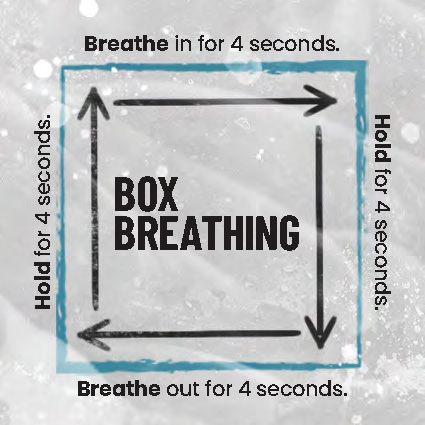Right now, there are a lot of things in our lives that can feel stressful. Keeping up with schoolwork, navigating news and social media, balancing your social life, or anything else that might be going on in your life can make things feel really overwhelming at times. But it’s okay, you’re not alone, and there are many tips and tricks to help manage the stress of everyday life, or even handle the bigger, sometimes unexpected stressors in your life. Here are some actions you can take to manage the stress in your life:
1. Box Breathing
Okay, so we’ve all heard the phrase “Take a deep breath,” but why do people say this and how does it actually help? Well, slowing down and regulating your breathing lowers the amount of a stress hormone in your body called cortisol — actually making you feel less stressed!
It also helps you to get out of what’s called “fight or flight mode.” Fight or flight mode is essentially your body’s hardwired reaction to something stressful, where it decides we must either fight what is making us afraid or run away (flight). Well, this might be helpful when an attacking tiger is what is making you stressed, it’s not so helpful for something like homework. Regulating your breathing gets you back into relaxation mode and able to clearly think through a solution to your stress.
Lastly, regulating your breathing takes your mind off the stressor and puts you more in touch with your body. Think of it as a kind of meditation. It can be a valuable thing for self-care even outside times of stress.
Box breathing is just one of many methods to regulate your breathing, but it is a popular one since it combines visualization with taking long, deep breaths.
To box breathe, picture a box (or square) in your head. Count to four as you breathe in and trace the top side of your imaginary box. When you reach the corner of your box (and finish your count of four), hold your breath for a count of four as you trace the side of your imaginary box. Now, exhale for a count of four while tracing the bottom, and hold for a count of four as you trace the side. Continue this process until you begin to feel less stressed.

If you find yourself running out of breath, try counts of three instead. There are also a variety of other breathing exercises you can try out to find the right one for you! Simply look up “breathing exercises for stress” online.
2. Music Meditation
This one’s pretty simple — pick a song you like, relax, and ask yourself “How does my body feel? How does this song make me feel emotionally?” Music can have a lot of power over your mood and state of mind. For more information about using music for meditation and stress relief, check out our blog Music for Mental Health and Self-Care.
3. Spotlight Your Senses
If you’re able to, go for a walk and pay attention to your senses. Note the sights, smells, and feelings you experience. Try to name:

While this is a great way to refocus your mind and de-stress, it’s also exercise! Exercise is another great way to lower your stress levels and improve your overall wellbeing. You can take a walk in your neighborhood, or get out in some nature! A change of scenery can do the mind a world of good. And nature is closer than you think! Check out AllTrails to find nearby nature and walking paths.
4. The STOP Technique
This is a method that’s best for helping with those unexpected, challenging stressors. If you feel really overwhelmed and don’t know what to do, try to STOP:
Stop. Ask yourself: What am I feeling right now?
Take a breath. Ask yourself: Am I breathing too fast or holding my breath? Can I take a deep breath?
Observe. Ask yourself: What else am I feeling in my body? What are my thoughts?
Proceed. Ask yourself: Am I okay with what happens if I ___? Proceed in the way that is best for you, incorporating what you’ve learned through the exercise.
5. Eat or Drink
Sometimes, we’re so stressed out that we forget to take care of ourselves. One great way to destress and also practice self-care is to eat a healthy snack or drink some water during times of stress.
As you eat, focus on the texture of the food — Is it soft? Crunchy? Melty? Then, take notice of the flavor — Is it bitter? Sour? Sweet? Savory? Continue to focus on every sensation you’re experiencing as you eat.
Drinking water is also a great way to regulate your breathing. If you’re taking shallow breaths, try drinking some water to slow down your breathing and begin to regulate. Cold water or ice is also a great way to snap yourself to the present. It gives your brain something to react to other than your stress.
Eating right and hydrating also has a strong effect on your anxiety level and mood. Being fed and hydrated lowers your cortisol levels and supports the neurotransmitters in your brain that stabilize your mood. If you’re feeling stressed, think about the last time you ate or drank and try to take care of yourself.
6. Seek Out Supportive Relationships
Having a supportive friend or loved one to talk to about your stress can really help to calm you down and put things into perspective. Sometimes it can also be helpful to hang with a friend and not talk about what’s stressing you out. Just have some time to relax and focus on something else. It is especially important to reach out to others if your stress if making you isolate or keep to yourself.
Remember, you don’t have to do this on your own. Humans were designed to be social creatures, and leaning on each other for support is in our DNA. Make a list of supportive friends who make you feel good and take steps to connect with them soon, whether that’s a text, phone call, or an in-person conversation.
Stress can feel like it has control of your life, but the most important thing to remember is that these feelings are temporary. You’re so strong and you’re going to get through them. Maybe bookmark this blog on your phone to remind you of some ways to manage your stress the next time you’re feeling overwhelmed. But remember, there’s no shame in needing some additional help. Here are some resources to reach out to if you need more support:
- Teen Line
- If you have a problem or just want to talk with another teen who understands, then this is the right place for you! Call, Text, or Email us. Check out “Ask TEEN LINE,” find resources in the Youth Yellow Pages, or join conversations with other teens on message boards.
- The Crisis Text Line
- The Crisis Text Line is the only 24/7, nationwide crisis-intervention text-message hotline. The Crisis Text Line can be reached by texting HOME to 741-741.
- California Warmline
- 1-855-845-7415 available 24/7
- A non-emergency resource for anyone seeking emotional support
If you feel like hurting yourself, please call 911 or the National Suicide Prevention Lifeline at 988.
